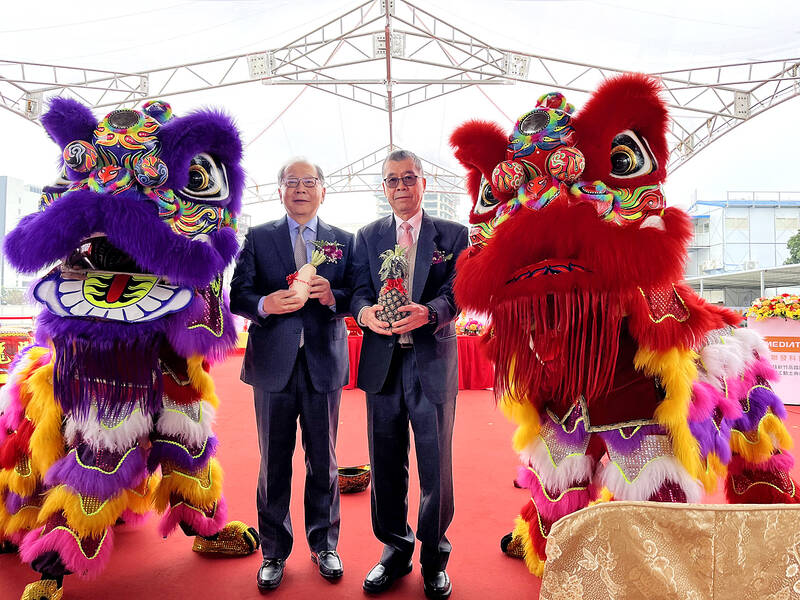MediaTek Inc (聯發科), the world’s biggest mobile phone chip supplier, yesterday said application-specific integrated circuits (ASIC) for artificial intelligence (AI)-enabled data centers and auto chips would be its dual revenue growth engines in next decade.
The Hsinchu-based chip designer made the remarks in response to a shareholder’s question about the company’s next growth drivers, given that the smartphone market is reaching a plateau.
“5G, AI and automotive are the areas with potential growth in next 10 years. AI covers a wide range of applications, from cloud to edge devices,” company chairman Tsai Ming-kai (蔡明介) said during an annual general meeting yesterday.

Photo: Liao Hsueh-ju, Taipei Times
“MediaTek has been developing products for mobile phones and various applications mostly for edge devices,” Tsai said.
It would be natural for the firm to shift to AI-powered cloud computing devices and automotive applications, given its rich intellectual property portfolios, he said.
“The revenue contribution is still small. We are making smooth progress,” Tsai said.
Mobile phone chips were the biggest revenue contributor in the last quarter, making up 60 percent of the company’s total revenue.
MediaTek earlier this year introduced its first automotive chip portfolio, dubbed Dimensity Auto Cockpit, which runs large language models, allowing vehicles to support chatbots, rich content delivery to multiple displays, driver alertness detection, and other AI-based safety and entertainment applications.
The Dimensity Auto Cockpit chipsets integrate a state-of-the-art Armv9-A system, Nvidia’s next-generation deep learning accelerator with generative AI capabilities, as well as Nvidia RTX graphics, MediaTek said.
Aside from the automotive segment, MediaTek has been heavily investing in the development of ASIC and Arm computing, company CEO Rick Tsai (蔡力行) told shareholders.
They have “high confidence” that those new technologies would yield plenty of growth in the next three to five years, he said.
The company also said it wanted to tap into the rapidly-growing market of AI ASIC accelerators for data centers, which is estimated to grow from US$12 billion this year to US$40 billion by 2028.
MediaTek is vying for a 10 percent market share, it told investors last month.
It also aims to continue growing revenue at an annual pace of 15 percent this year, on the back of a recovery from an inventory correction cycle post-COVID-19 pandemic and strong uptake of its flagship smartphone chips.
Customers started rebuilding smartphone chip inventory early this year, after reducing inventory to a very low level at the end of last year, Tsai said.
However, customers’ restocking demand has come to an end this quarter, he said, adding that their inventory has reached a “balance.”
MediaTek’s shareholders yesterday approved the distribution of a cash dividend of NT$26.4 per share, based on the first half of last year’s earnings of NT$20.71 per share, and another cash dividend of NT$30.4 a share for the second half, based on its EPS of NT$27.79.
Shareholders also approved the board director nominations of Tsai Ming-kai, Rick Tsai and chief operating officer Joe Chen (陳冠州).
A majority of the nominees are existing directors, except Chang Yao-wen (張耀文), dean of the College of Electrical Engineering and Computer Science at National Taiwan University.
Chang replaced Tang Ming-je (湯明哲) as an independent director.

United Microelectronics Corp (UMC, 聯電) expects its addressable market to grow by a low single-digit percentage this year, lower than the overall foundry industry’s 15 percent expansion and the global semiconductor industry’s 10 percent growth, the contract chipmaker said yesterday after reporting the worst profit in four-and-a-half years in the fourth quarter of last year. Growth would be fueled by demand for artificial intelligence (AI) servers, a moderate recovery in consumer electronics and an increase in semiconductor content, UMC said. “UMC’s goal is to outgrow our addressable market while maintaining our structural profitability,” UMC copresident Jason Wang (王石) told an online earnings

Gudeng Precision Industrial Co (家登精密), the sole extreme ultraviolet (EUV) pod supplier to Taiwan Semiconductor Manufacturing Co (TSMC, 台積電), is aiming to expand revenue to NT$10 billion (US$304.8 million) this year, as it expects the artificial intelligence (AI) boom to drive demand for wafer delivery pods and pods used in advanced packaging technology. That suggests the firm’s revenue could grow as much as 53 percent this year, after it posted a 28.91 percent increase to NT$6.55 billion last year, exceeding its 20 percent growth target. “We usually set an aggressive target internally to drive further growth. This year, our target is to

The TAIEX ended the Year of the Dragon yesterday up about 30 percent, led by contract chipmaker Taiwan Semiconductor Manufacturing Co (TSMC, 台積電). The benchmark index closed up 225.40 points, or 0.97 percent, at 23,525.41 on the last trading session of the Year of the Dragon before the Lunar New Year holiday ushers in the Year of the Snake. During the Year of the Dragon, the TAIEX rose 5,429.34 points, the highest ever, while the 30 percent increase in the year was the second-highest behind only a 30.84 percent gain in the Year of the Rat from Jan. 25, 2020, to Feb.

Cryptocurrencies gave a lukewarm reception to US President Donald Trump’s first policy moves on digital assets, notching small gains after he commissioned a report on regulation and a crypto reserve. Bitcoin has been broadly steady since Trump took office on Monday and was trading at about US$105,000 yesterday as some of the euphoria around a hoped-for revolution in cryptocurrency regulation ebbed. Smaller cryptocurrency ether has likewise had a fairly steady week, although was up 5 percent in the Asia day to US$3,420. Bitcoin had been one of the most spectacular “Trump trades” in financial markets, gaining 50 percent to break above US$100,000 and